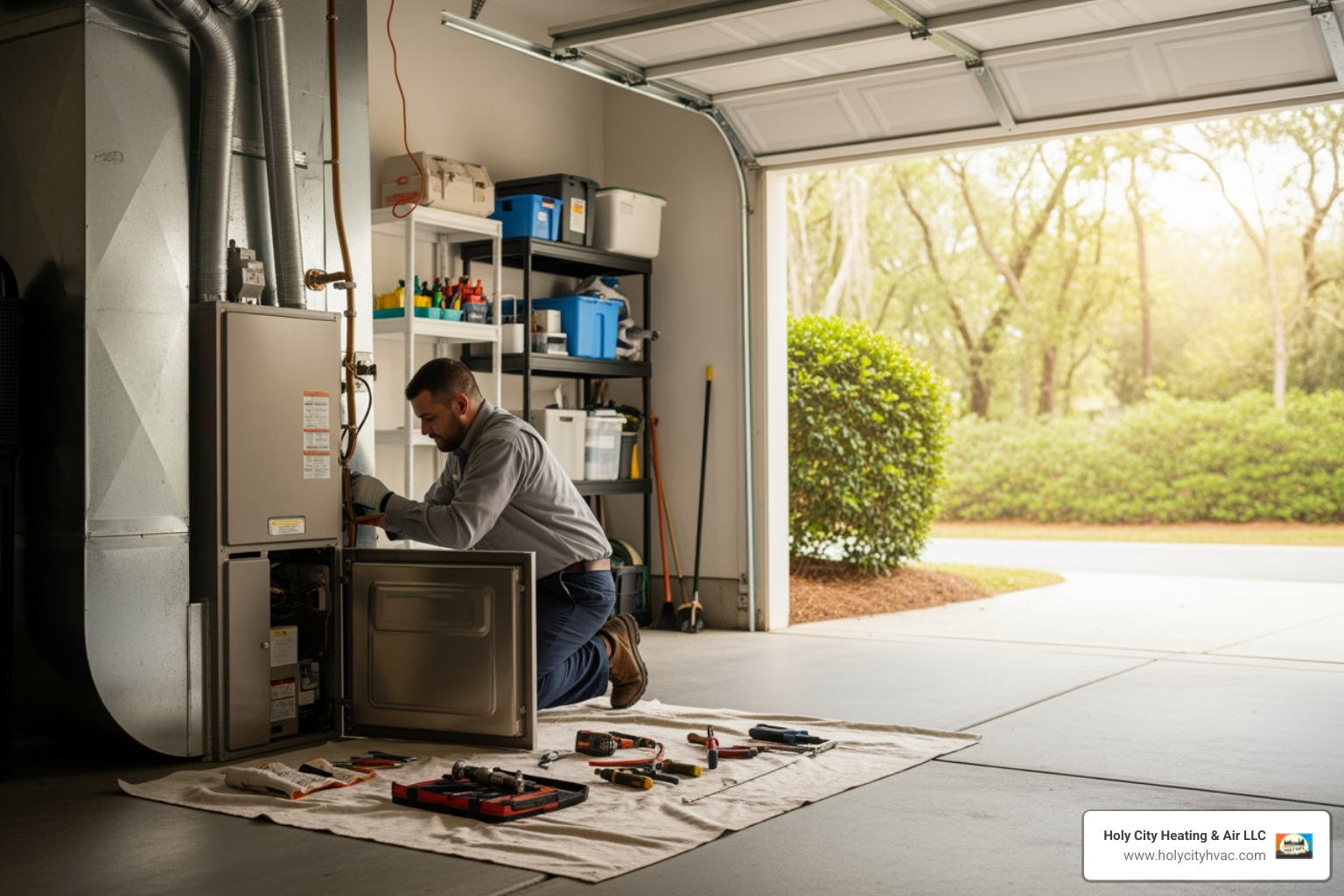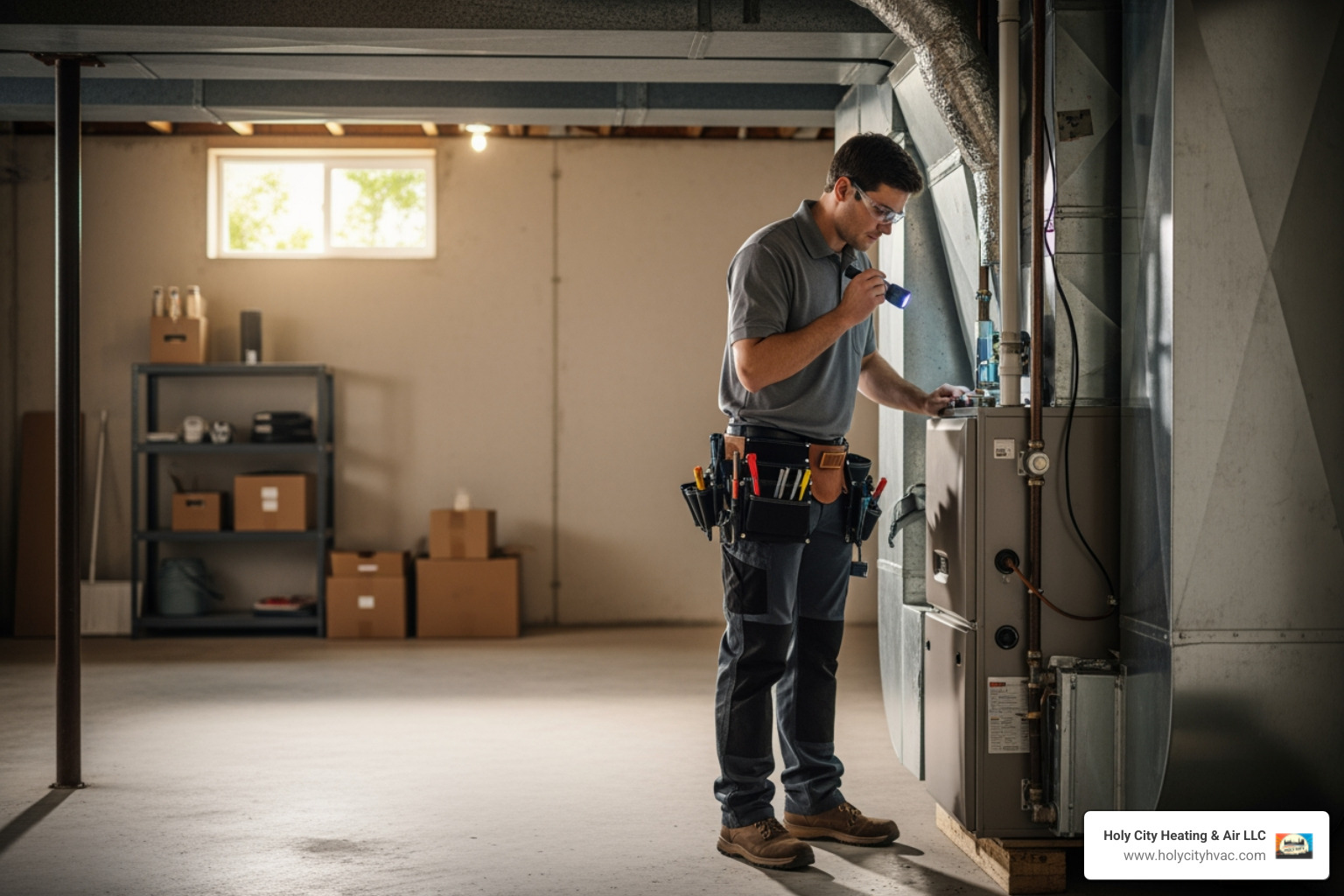
Why Your Business Can't Afford Hot Water Downtime
Commercial water heater installation is a critical investment that directly impacts your operations, customer satisfaction, and bottom line. When hot water fails in a restaurant, hotel, or manufacturing facility, the consequences go far beyond inconvenience, leading to lost revenue, health code violations, and unhappy customers.
Unlike residential models, commercial units are significantly larger (40 to 500+ gallons) and built for heavy use, lasting 10-20+ years with proper maintenance. Professional installation, which typically takes 4-8 hours, is required for safety, code compliance, and warranty protection. The commercial water heater market was worth $5.4 billion in 2020 and is projected to reach $7.7 billion by 2026, reflecting how essential these systems are for modern businesses.
A restaurant during a dinner rush or a hotel during morning checkout can demand massive amounts of hot water instantly. Downtime isn't an option when your business depends on it.
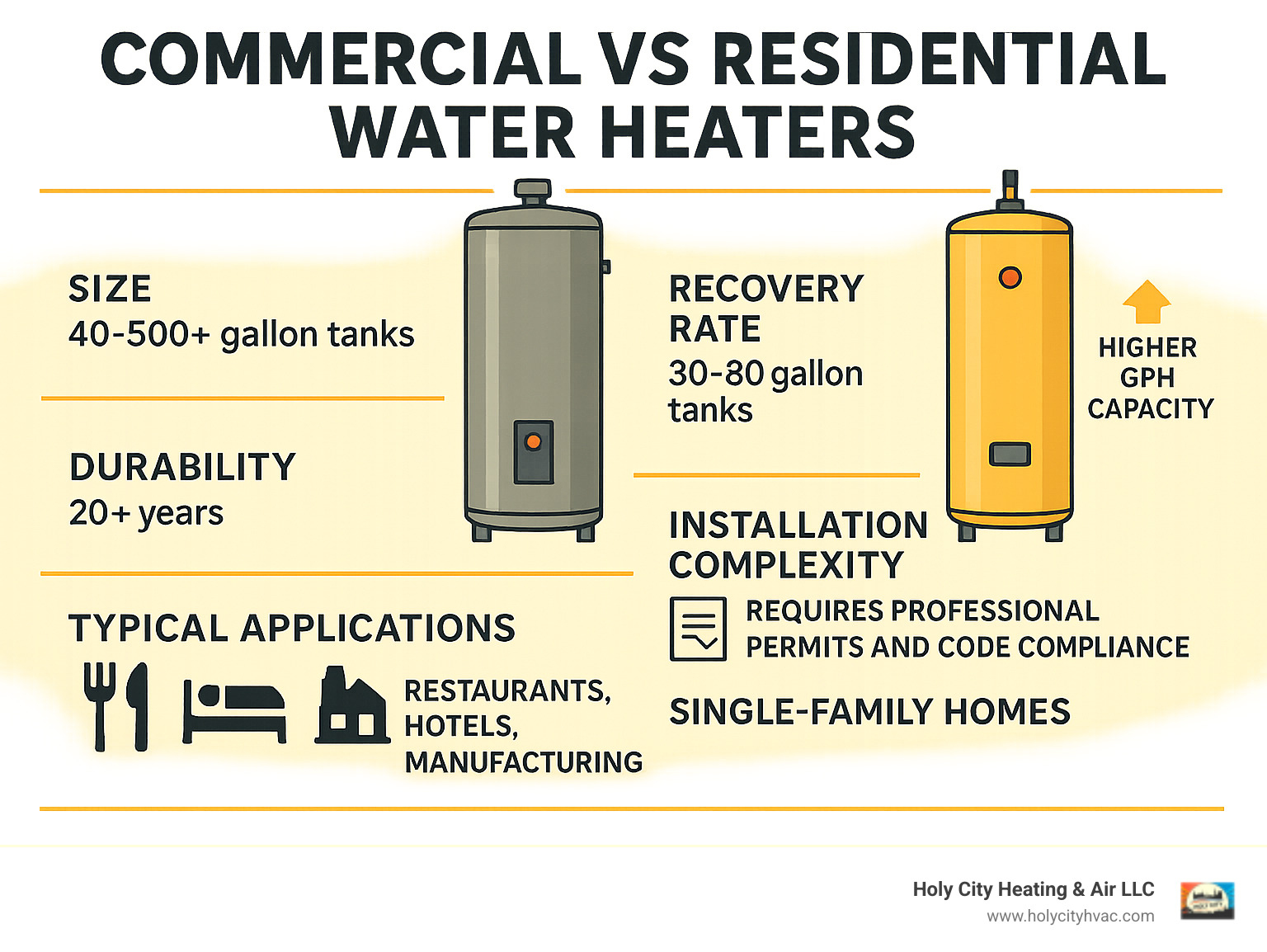
Planning & Selection: Choosing the Right System for Your Needs
The key to a successful commercial water heater installation is planning. Before any work begins, we assess your business's specific needs. Commercial water heaters are fundamentally different from residential units. While a home might use a 40-gallon tank, commercial operations require systems from 75 to over 500 gallons. They are built with thicker insulation and more robust components to handle constant use, giving them a lifespan of 15-20 years or more, compared to 8-12 years for residential models.
Our planning process starts with a thorough site assessment of your building's layout, plumbing, and utility capacity. We perform a detailed load calculation, considering your business type, customer volume, and every fixture that uses hot water. This ensures you never run out of hot water during peak usage periods. For budgeting, we typically find that buying a unit is a smarter long-term investment than leasing, saving thousands over the system's lifespan.
Types of Commercial Water Heaters
Choosing the right type of commercial water heater is crucial for efficiency and performance.
- Tank-style water heaters store large volumes of hot water, making them ideal for businesses with high, simultaneous demands like restaurants. Their main drawback is the constant energy use to maintain water temperature.
- Tankless (on-demand) systems heat water as needed, offering significant space and energy savings. They are excellent for smaller operations but must be sized carefully to handle peak flow rates.
- Hybrid heat pump models are highly efficient, pulling heat from the surrounding air to warm water. They have higher upfront costs and require good ventilation, making them best for warmer climates.
- High-efficiency condensing units are the top tier for gas-fired technology, capturing waste heat from exhaust to achieve thermal efficiencies up to 97%. This makes them cost-effective to run despite a higher initial investment.
| Type | Best For | Key Benefit | Main Consideration |
|---|---|---|---|
| Tank-Style | High-volume operations | Handles peak demands well | Continuous energy use |
| Tankless | Smaller businesses, space-limited | Energy efficient, endless supply | Higher upfront cost |
| Hybrid | Warm climates, large spaces | Lowest operating costs | Needs ventilation |
| Condensing | Maximum efficiency goals | Up to 97% thermal efficiency | Higher initial investment |
The key differences between commercial and residential units extend beyond size to durability and capacity.
Sizing and Capacity: Getting It Just Right
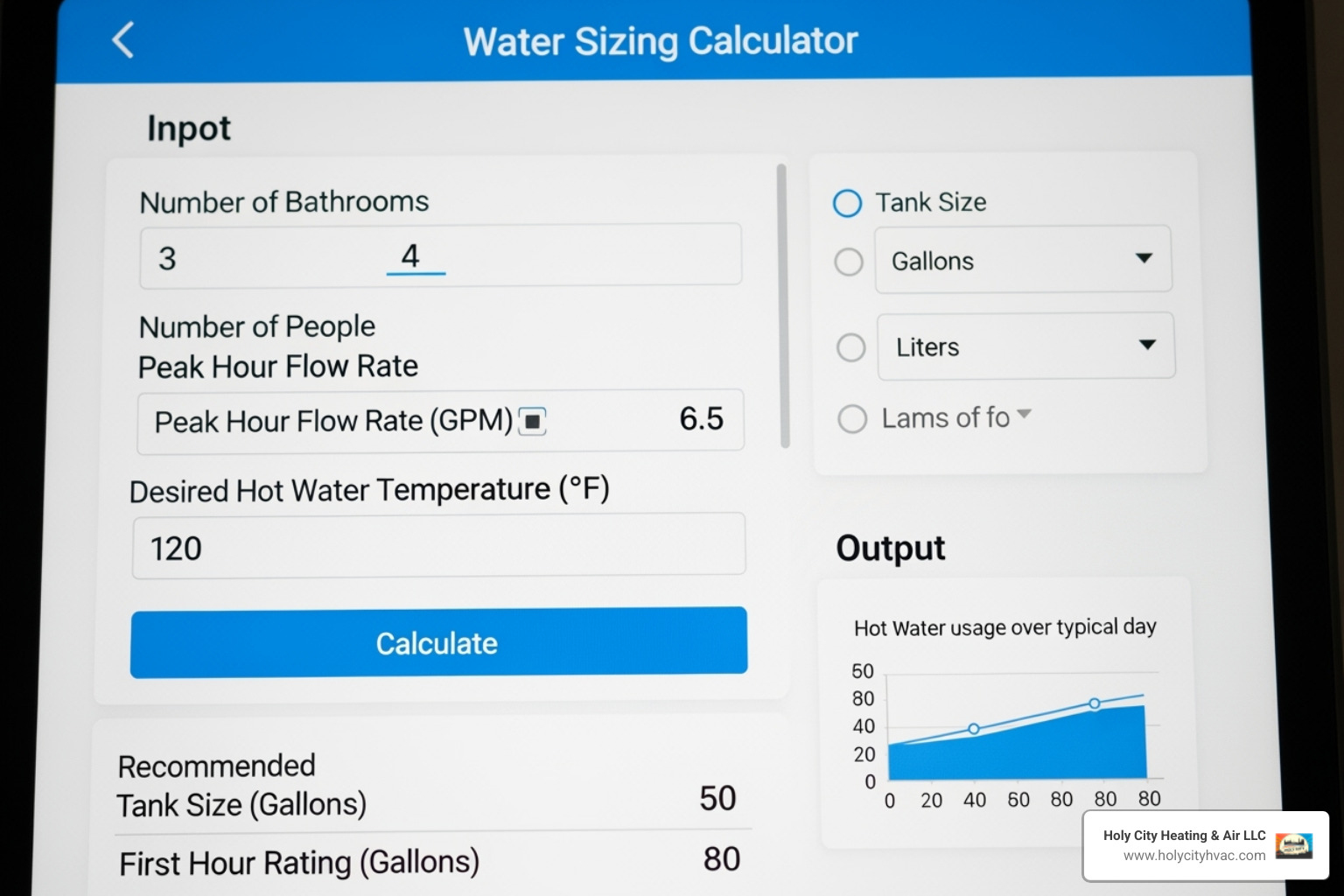
Proper sizing is critical for a commercial water heater installation. Too small, and you'll have cold water and unhappy customers; too large, and you'll waste money on energy. We focus on key metrics: Gallons Per Hour (GPH), which measures reheating speed, and First Hour Rating (FHR), which indicates the total hot water available in the first hour of peak use. For tankless systems, we calculate the required Gallons Per Minute (GPM) flow rate.
Your business type—be it a restaurant, laundromat, or office—dictates your hot water needs. We analyze your fixture count and peak usage patterns to determine the right capacity. Climate also matters; colder incoming water in winter requires the heater to work harder. We use professional sizing calculators and our experience to ensure your system is perfectly matched to your demand.
Key Financial Decisions: Fuel, Efficiency, and Costs
Your financial decisions during planning will affect your operating costs for years. Natural gas typically offers the lowest operating costs, while propane is a great alternative for locations without gas line access. Electric systems have a lower upfront cost and simpler installation but often have higher long-term energy expenses.
Focusing on energy efficiency is a smart business move. High-efficiency units, identified by a high Uniform Energy Factor (UEF), cost more initially but significantly reduce monthly bills. We help you steer available tax credits and rebates from utility and government programs, which can offset a large portion of the upfront cost. By analyzing the total cost of ownership, choosing an efficient water heater often becomes the most economical option in just a few years.
The Professional Commercial Water Heater Installation Process
Once the ideal system is selected, the commercial water heater installation begins. This complex process requires specialized knowledge of commercial plumbing, electrical, and gas systems, which handle higher volumes and pressures than residential setups. The stakes are high, as your business relies on this system.
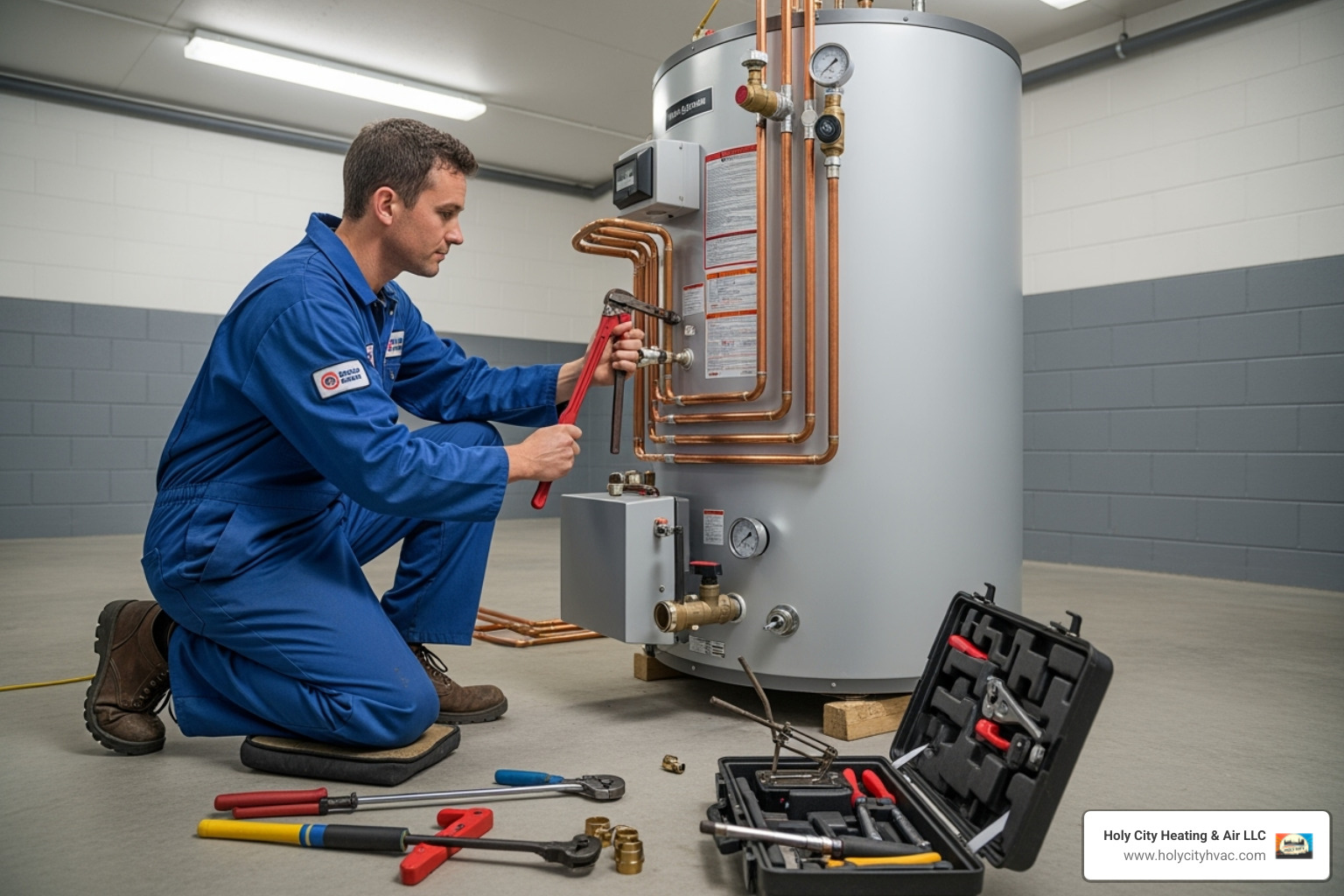
Attempting a DIY installation or hiring an inexperienced contractor can lead to dangerous gas leaks, fire hazards from incorrect wiring, or carbon monoxide issues from improper venting. Professional installation is essential for safety and reliability. We provide a detailed project timeline, starting with an evaluation of your existing infrastructure. If upgrades are needed, we find efficient solutions to keep the project on track. For complex jobs, we may use project management software for complex jobs to ensure a smooth process.
Step 1: Site Preparation and Safety Protocols
Safety is our top priority. Before starting, we clear the work area and shut off the relevant utilities (water, gas, electricity). We understand that this means temporary downtime, so we work efficiently to complete most installations within a single business day. Our team arrives with all necessary safety equipment and adheres to strict OSHA standards.
We also handle all required permits and code compliance. Municipal permits ensure the installation meets local building codes and safety standards. Following effective water heating safety standards is not just a suggestion; it's a requirement that protects your business, employees, and investment.
Step 2: A Guide to Your Commercial Water Heater Installation
With the site prepared, our technical work begins. We start by positioning the new heater, ensuring it meets manufacturer and code specifications for clearance and maintenance access. If we are removing an old unit, we do so safely and responsibly, inspecting the area for any pre-existing damage.
Next, we make the water line connections using durable materials like Type L copper piping suited for commercial demands. For gas or electrical hookups, we ensure everything is sized and connected correctly. Gas lines are carefully tested for leaks, while electrical systems may require panel upgrades to handle the load. Venting installation for gas units is critical for safely removing combustion byproducts. We follow all codes to prevent dangerous gas buildup, ensuring every detail is handled professionally.
Step 3: Final Checks and System Activation
The installation is not finished until we conduct thorough testing. We perform leak testing on all water and gas connections using professional detection equipment. We also test the pressure relief valve to ensure this critical safety feature is functional. The system is then bled to remove any trapped air that could impede performance.
After a final inspection of our work, we proceed with system commissioning. We fire up the new water heater, monitor its initial cycle, and verify that hot water is delivered to all fixtures at the correct temperature and pressure. Before we leave, we'll walk you through the system's basic operation, ensuring you are confident with your new commercial water heater installation.
Post-Installation: Maintenance and Maximizing Efficiency
Your commercial water heater installation is the start of a long-term relationship with your new system. Just like a work vehicle, it requires regular maintenance to perform reliably and avoid unexpected breakdowns. Proactive maintenance is always more cost-effective than reactive repairs, preventing minor issues from becoming major emergencies that could shut down your business.
Regular service can extend your system's life by up to 50%, meaning you could get 15-20 years of service from a unit that might otherwise fail in 10. We also recommend tracking your energy bills and hot water performance, as sudden changes can signal developing problems. Training your staff to report issues like lukewarm water or strange noises creates an early warning system that protects your investment.
Essential Maintenance for Your Commercial Water Heater Installation
Regular service keeps your commercial water heater running efficiently. Our maintenance visits focus on these key tasks:
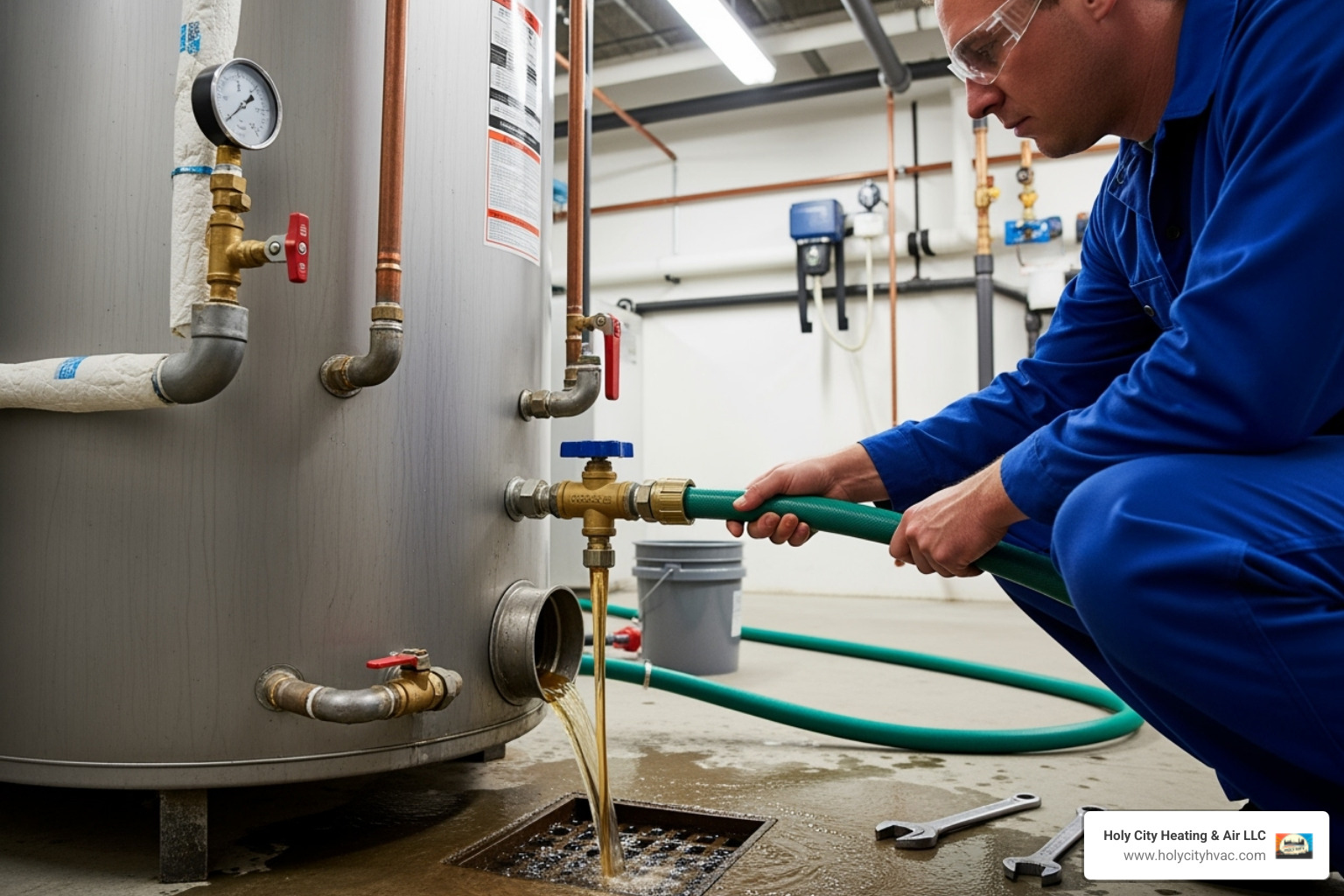
- Tank Flushing: We remove mineral sediment that builds up in the tank, which improves efficiency and prevents premature failure.
- Anode Rod Inspection: The anode rod protects the tank from corrosion. We check it for wear and replace it when necessary to prevent rust from damaging the tank.
- Pressure Relief Valve Testing: We test this critical safety device to ensure it functions correctly, preventing dangerous pressure buildup.
- Burner and Element Inspection: For gas units, we clean the burners to ensure efficient combustion. For electric units, we inspect heating elements for wear.
- Leak Detection: We check all connections, pipes, and the tank for even the smallest leaks, which can waste water and cause damage over time.
- Venting System Inspection: For gas units, we ensure the venting system is clear and intact to prevent dangerous carbon monoxide buildup.
Signs Your Water Heater Needs Replacement
Even a well-maintained unit will eventually need replacement. Knowing the warning signs helps you plan ahead and avoid an emergency.
- Age: If your tank-style heater is over 10-15 years old or your tankless unit is over 15-20, it's wise to start planning for a replacement.
- Rusty Water: Discolored hot water indicates internal corrosion and that the tank is weakening.
- Strange Noises: Popping or rumbling sounds often mean there is significant sediment buildup, forcing the system to overwork.
- Visible Leaks: Any leak around the unit requires immediate attention, as a small drip can quickly become a major flood.
- Insufficient Hot Water: If your system can no longer meet your business's demands, it may be failing.
- Frequent Repairs: If repair costs and energy bills are rising, replacement is often the more economical choice.
How to Boost Your System's Energy Efficiency
Maximizing efficiency saves money and reduces your environmental footprint. Here are some effective strategies:
- Pipe Insulation: Wrapping hot water pipes prevents heat loss as water travels to your fixtures.
- Heat Traps: These inexpensive devices prevent heat from escaping the tank through the pipes.
- Temperature Optimization: Lowering the thermostat setting, even slightly, can save significant energy without impacting operations.
- Low-Flow Fixtures: Modern faucets and showerheads reduce hot water consumption without sacrificing pressure.
- Smart Controls: Programmable thermostats can lower temperatures during off-hours to save energy automatically.
- Upgrade to High-Efficiency Models: The greatest long-term savings come from upgrading to an energy-efficient commercial water heater. Models like condensing units or heat pump hybrids can dramatically cut operating costs.
Frequently Asked Questions about Commercial Water Heaters
Here are answers to the most common questions we receive about commercial water heater installation.
How much does a commercial water heater installation cost?
The total cost varies based on several factors. The unit itself can range from $2,500 to $5,000+, depending on size, type, and efficiency. Labor costs depend on the installation's complexity—a simple swap is quicker and less expensive than a job requiring new plumbing, gas lines, or electrical work. You should also budget for permit fees, which are required by most municipalities for safety and code compliance. We provide a detailed, transparent estimate upfront so you know the full cost before we begin.
How long does a commercial water heater last?
Commercial water heaters are built for durability. While a residential unit might last 8-15 years, a well-maintained commercial model can serve your business for 10-20+ years. The key to achieving this long lifespan is regular professional maintenance, such as annual flushing and anode rod inspections. Manufacturer warranties typically reflect this expected longevity, and we'll review the details with you.
Why is professional installation critical for commercial units?
Skipping professional installation to save money is a significant risk that can cost you more in the long run. Here's why it's essential:
- Safety: Commercial systems involve high-voltage electricity, pressurized gas lines, and scalding water. Licensed professionals are trained to handle these hazards safely, preventing fires, leaks, and injuries.
- Code Compliance: Installations must meet strict local building codes. A failed inspection can lead to fines or forced re-installation. We ensure all work is done to code.
- Warranty Protection: Most manufacturers will void their warranty if the unit is not installed by a licensed professional, leaving you responsible for any repair costs.
- Performance: Proper installation ensures your system runs efficiently and reliably, saving you money on energy bills and preventing the costly errors associated with improper setup.
Conclusion: Secure Your Business's Hot Water Supply
Your business's hot water supply is a foundational utility that keeps your operations running. From restaurants to hotels, reliable hot water is non-negotiable. A professional commercial water heater installation is a strategic investment in your business's future, protecting you from costly downtime and ensuring customer satisfaction.
The process involves careful planning, proper system selection, expert installation, and ongoing maintenance. Cutting corners on any of these steps can jeopardize your business. At Holy City Heating & Air, we have helped Charleston area businesses with their hot water needs since 2015.
As a family-owned company with over two decades of industry expertise, we understand that every business is unique. Our EPA-certified, licensed professionals partner with you to find solutions that fit your needs and budget. We proudly serve Charleston and surrounding communities, including Kiawah Island, Johns Island, Mt Pleasant, North Charleston, Daniel Island, and Summerville. We combine the resources of a growing company with the personal care of a local business.
When you work with us, you get more than an installation—you get peace of mind. Don't wait for an emergency to disrupt your business. Take control of your hot water supply today.
Ready to secure your business's hot water future? Learn more about our water heater services in Charleston, SC and find how we can help keep your hot water flowing reliably for years to come.
Recent posts






